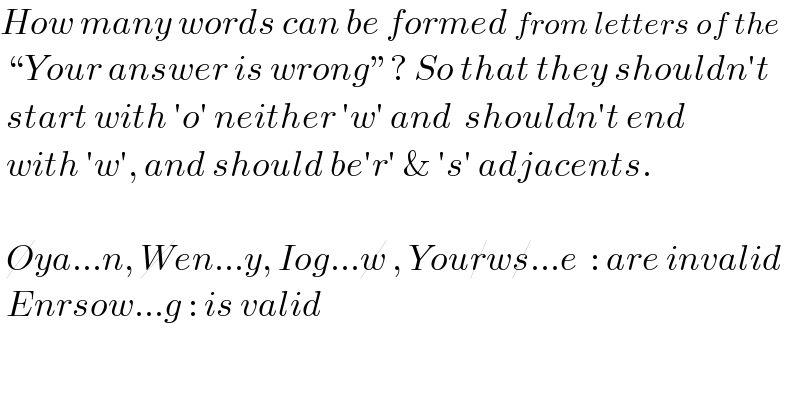
Previous in Probability and Statistics Next in Probability and Statistics
Question Number 180162 by Acem last updated on 08/Nov/22

$${How}\:{many}\:{words}\:{can}\:{be}\:{formed}\:{from}\:{letters}\:{of}\:{the} \\ $$ $$\:\natural{Your}\:{answer}\:{is}\:{wrong}\varepsilon?\:{So}\:{that}\:{they}\:{shouldn}'{t} \\ $$ $$\:{start}\:{with}\:'{o}'\:{neither}\:'{w}'\:{and}\:\:{shouldn}'{t}\:{end} \\ $$ $$\:{with}\:'{w}',\:{and}\:{should}\:{be}'{r}'\:\&\:'{s}'\:{adjacents}. \\ $$ $$ \\ $$ $$\:\cancel{{O}ya}...{n},\:\cancel{{W}en}...{y},\:{Iog}...\cancel{{w}}\:,\:{You}\cancel{{r}w}\cancel{{s}}...{e}\:\::\:{are}\:{invalid} \\ $$ $$\:{Enrsow}...{g}\::\:{is}\:{valid} \\ $$ $$ \\ $$
Commented byJDamian last updated on 08/Nov/22

$${Define}\:\natural{word}\varepsilon \\ $$
Commented byAcem last updated on 08/Nov/22

$${from}\:{letters}\:{of}\:{that}\:{sentence} \\ $$
Commented bymr W last updated on 08/Nov/22

$${just}\:{to}\:{make}\:{clear},\:{a}\:{word}\:{should}\:{not} \\ $$ $${start}\:{with}\:{o}\:{or}\:{w},\:{and}\:{should}\:{not} \\ $$ $${end}\:{with}\:{w},\:{and}\:{r}\:\&\:{s}\:{should}\:{not}\:{be} \\ $$ $${adjacent}.\:{correct}? \\ $$
Commented byJDamian last updated on 08/Nov/22
I meant real English words?
Commented byAcem last updated on 08/Nov/22

$${Good}\:{morning}\:{Sir},\:{yes}\:{but}\:{r\&s}\:{are}\:{adjacents},\: \\ $$ $${I}\:{modified}\:{the}\:{question},\:{with}\:{some}\:{examples} \\ $$ $$\:'{English},\:{French}\:{and}\:{German}\:{are}\:{not}\:{my} \\ $$ $$\:{nation}\:{language}'\:{so},\:{sorry}\:{for}\:{all}\:{if}\:{i}\:{couldn}'{d} \\ $$ $$\:{express}\:{some}\:{phrases}\:{accurately} \\ $$
Commented byAcem last updated on 08/Nov/22

$${Mr}.\:{JDamian},\:{the}\:{idea}\:{is}\:{not}\:{in}\:{words}\:{with}\: \\ $$ $$\:{well}−{known}\:{meaning},\:{imagine}\:{that}\:{as}\: \\ $$ $${different}\:\left({codes},\:{passwords},\:{forms},\:{color},...\:{etc}\right) \\ $$
Commented bymr W last updated on 08/Nov/22

$$@{Acem}\:{sir}: \\ $$ $${thanks}\:{for}\:{clarification}!\:{i}\:{understand} \\ $$ $${now}\:{the}\:{question}. \\ $$
Commented byAcem last updated on 08/Nov/22

$${That}'{s}\:{good}\:{Sir},\:{good}\:{luck},\:{and}\:{thanks}\:{for}\:{alerting} \\ $$ $$\:{me}\:{about}\:{some}\:{unclear}\:{details}. \\ $$
Commented byAcem last updated on 02/Dec/22

$${If}\:{someone}\:{like}\:{to}\:{try}\:{before}\:{writing}\:{the}\:{solution} \\ $$ $$\:{tomorrow} \\ $$
